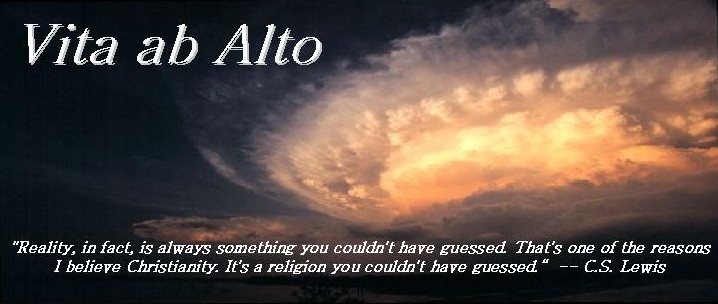Christian Carnival LXXII

This week's Christian Carnival is up at A Physicist's Perspective. If you're coming here from Mobley's place, welcome!
APP is an worthwhile site in an of itself for those interested in the growing intelligent design / anthropic principle debate. I am one such and plan to check the site frequently from now on. This subject cuts across ideological lines, with a number of conservatives (like John Derbyshire at National Review) agin' it and many left-wing Christians fer it. It may be a bellwether for a coming ideological realignment along philisophical lines--God-believing "absolutists" versus humanist "relativists"--that would rearrange political lines as well.
CC LXXII also has a good section devoted just to posts on ID/AP:
Intelligent Design/Science and Faith: "In the beginning was the Word, and the Word was with God, and the Word was God. He was with God in the beginning. Through him all things were made; without him nothing was made that has been made. In him was life, and that life was the light of men." (John 1:1-4)
Viewpoint writes Reply to an ID critic, a response he sent to his local paper after it published an editorial critical of Intelligent Design.
dokeo kago grapho soi kratistos Theophilos sends Luke the physician looks at scientific education in America:
Reflections on the origin of the dispute about scientific education in America and why it will not end
Christianity is Jewish offers up Think Outside the Locks, which points out that the naturalistic worldview is rather at odds with the idea of a supernatural God.
I'm also happy to see an ad on APP for John MacArthur's excellent Gospel According to Jesus, which was out of print for awhile. It's an outstanding appeal for the "mainstream Protestant" position concerning works, written for the more "easy-believing-I-can-do-anything-since-God-will-forgive-me" type of evangelical. (I know a few.) "Lordship salvation"--believe it; live it!
While you're at CC LXXII, check out this long but worthy post about personalities and abuse of power within congregations at The Wittenberg Gate. This is of interest to me, having dealt with some of the types and issues she writes about. Interestingly, she also comes to a conclusion I came to myself some time ago:
One of the commenters to a previous post mentioned that this problem points out the need for denominational structure that holds pastors and elders accountable, because without such accountability, abusive leaders can flourish unabated. I am in total agreement with that assessment, and believe that that accountability is the only way, short of criminal prosecution when appropriate, for removing a manipulative or abusive pastor. However, even when that structure is in place, it is very difficult for those leaders to correctly identify the problem--and if they do, they will find they have a tiger by the tail.
This is one reason (but not the only one) that I am a Reformed "mainline" Protestant--it's denominational structures best ensure something like a republican form of government, which is the best mechanism yet devised for ensuring balance and accountability. Many Baptist and independent evangelical churches are too democratic and thus prey to demogouges and mob sentiments. Monarchies like Catholicism may actually encourage corruption if the institutional interests of the church hierarchy are threatened. (Can you say "sodomy?" I knew you could.) No denomination is perfect; all have their built-in flaws and advantages. I'm still trying to figure out exactly how it is that Methodism works. I'm coming to the conclusion that no one really knows. I think its convoluted structure and ordainment procedure made sense to John Wesley, but he built it with the intention of running everything himself and keeping all other authorities compartmentalized. Only the Big Boss saw the whole picture. In this, he anticipated governmental "reforms" by Hitler, Stalin, and Saddam Hussein. It's an excellent way to run a dictatorship, benevolent or otherwise. It's a bit confusing to a Little Eichmann (as Ward Churhill would say) like me.
Dory is quite right in the WG post to point out that the Bible has clear warnings and guidance for dealing with many of the issues she brings up. Nothing is new and Paul, Peter, John, and James saw most of the problems we deal with in today's church first-hand in their own time.
Monk



